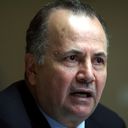Abbas appoints economic advisor as Palestinian Authority prime minister

Palestinian President Mahmoud Abbas appointed on Thursday the chairman of the Palestinian Investment Fund, Mohammed Mustafa, as prime minister of the Palestinian Authority and tasked him with forming a new government.
Why it matters: Mustafa's appointment and the formation of what is promised to be a technocratic government is the first political step in the effort to reform and revitalize the Palestinian Authority post-Oct. 7.
- Arab and Western countries are divided on whether Mustafa — an Abbas confidant — will have enough independence from the Palestinian president to enable significant reform of the Palestinian Authority.
- Mustafa's supporters say the fact that Abbas trusts him will allow him to conduct the needed reforms.
- The main goal of the new government will be to stabilize the Palestinian Authority in the West Bank and prepare a plan for how the PA can have a role in governing post-war Gaza. Abbas' government is facing an acute economic crisis.
Driving the news: Last month Palestinian Prime Minister Mohammed Shtayyeh resigned after five years in office amid growing pressure from the U.S. and Arab countries on Abbas to conduct wide-ranging reforms, including injecting "new blood" into the Palestinian Authority's leadership.
- The 69-year-old Mustafa is Abbas' chief economic adviser and served in the past as the minister of the economy and the deputy prime minister.
- He previously worked for the World Bank and received his doctorate degree from George Washington University.
Behind the scenes: Three U.S., Arab and Palestinian officials said there was an intense debate and pressure campaign from different Arab and Western countries on Abbas regarding the appointment of the new prime minister.
- Several Arab countries, including the United Arab Emirates, wanted a prime minister who is not one of Abbas' confidants and that will have more independent status, the sources said.
- One name mentioned was former Palestinian prime minister Salam Fayyad. According to Arab and U.S. officials, Abbas objected to appointing Fayyad but promised any new government will be technocratic.
- A source with direct knowledge said Qatar pressed Abbas to appoint to the new government people who are accepted by Hamas, including Islamists, so that it could be easier for the new government to operate in Gaza. Abbas rejected this request.
There was also some opposition to Mustafa's appointment inside the U.S. State Department because he is an Abbas loyalist and there was concern his appointment would not be a real step toward reform, according to Palestinian and U.S. officials.
- Several officials from the State Department and the White House have met Mustafa in recent months and heard from him what he plans to do if he is appointed, a senior Palestinian official said.
- The Palestinian official said Mustafa also shared with U.S. officials a written plan he drafted for post-war Gaza and the rehabilitation of the Palestinian Authority's economic situation.
- The Biden administration didn't weigh in on the identity of the new prime minister, and decided to judge Mustafa and his new government by its actions, a U.S. official said.
The Israeli government also decided to not oppose Mustafa's appointment.
- Israeli officials told their U.S. counterparts they don't have a problem with Mustafa and they will work with him on all bilateral issues other than Gaza, sources said.
- Netanyahu recently again rejected the involvement of the Palestinian Authority in post-war Gaza claiming it is supporting terrorism and can not implement the de-radicalization plan Israel is calling for in Gaza.
- Israeli minister of defense Yoav Gallant and the Israeli security and intelligence services think the Palestinian Authority will need to have a role in post-war Gaza so Palestinians have an alternative to Hamas, Israeli officials said.
What they're saying: "We welcome the appointment today of Dr. Mohammed Mustafa as Prime Minister of the Palestinian Authority, and we urge the formation of a reform cabinet as soon as possible," U.S. National Security Council spokesperson Adrienne Watson said in a statement on Thursday.
- "A reformed Palestinian Authority is essential to delivering results for the Palestinian people and establishing the conditions for stability in both the West Bank and Gaza."
The big picture: Mustafa's biggest challenge will be to prove to the U.S. and other western countries that support the PA and to leading Arab countries that he is credible, capable and willing to push for real reforms in the government.
- Without their confidence, the U.S., the EU and leading Arab countries are unlikely to press Israel to agree to allow the Palestinian Authority to play a role in any post-war plan for Gaza.
Editor's note: This story has been updated with a statement from the National Security Council.